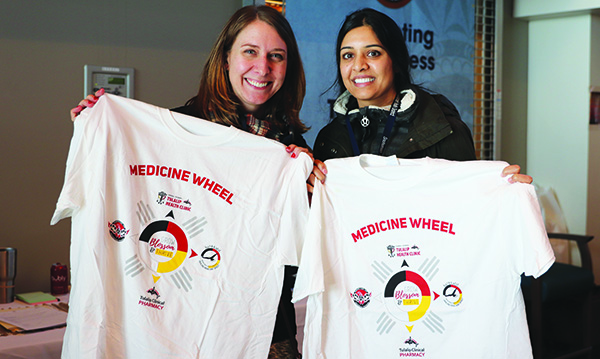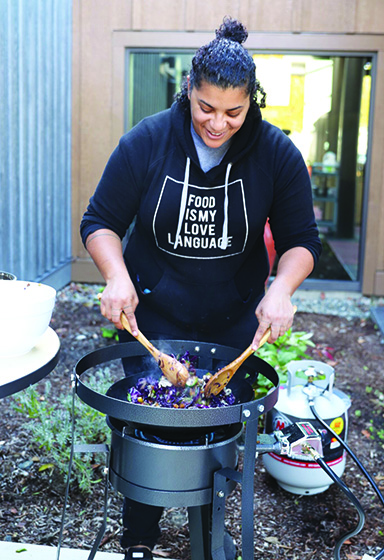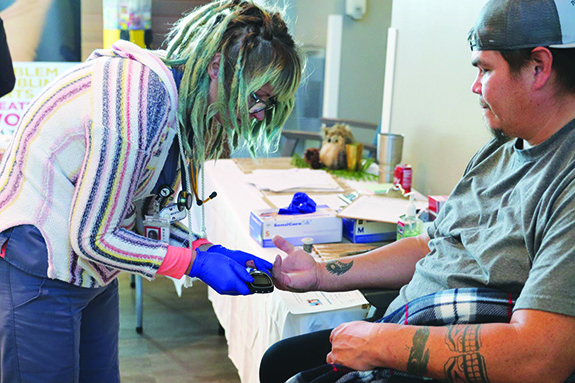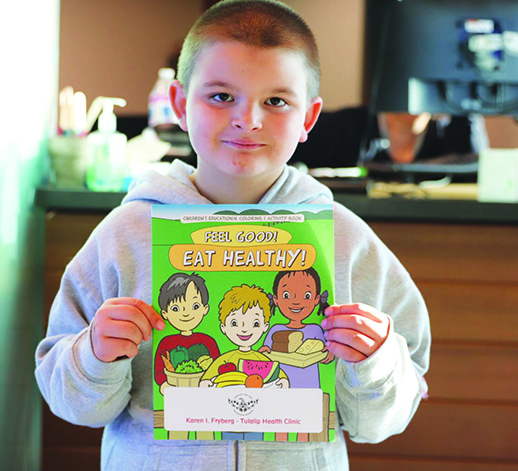
By Kalvin Valdillez, Tulalip News
A delightful aroma filled the air around the Karen I. Fryberg Health Clinic on November 5. Near the clinic’s entrance was Indigenous Chef Britt Reed, sizzling up a stir-fry mixture of cabbage, onion, celery and chicken. The chef displayed her outdoor culinary skills over a propane flame, and the large wok of fried veggies and protein garnered plenty of interest from clinic patients and those living with Type 1 or Type 2 diabetes in attendance of the Diabetes Care and Prevention program’s yearly Diabetes Day.

Occurring during National Diabetes Month, the event aims to educate and raise awareness about diabetes, while having a good time with the local community, through healthy tips, resources and support to those diagnosed with the disease.
“We like to take this day to spend some time with our patients, and maybe meet some new patients, to see how they are doing because it’s the end of the year,” explained Miguel Arteaga, Tulalip Health Clinic RN and Diabetes Educator. “Diabetes is exploding across the world, it’s always been a problem for the U.S. and particularly with minority people. At Tulalip, we want to present the community with the best information there is to help prevent diabetes.”
The six-hour event allowed attendees to get acquainted with fellow diabetics and build a strong sense of community as well as hear a number of presentations by local organizations and businesses. Event goers were served two meals and an assortment of tasty snacks throughout the day, learned of new foods and recipes and how to prepare well-balanced meals to manage their diabetes more efficiently.
“65% of patients with prediabetes can prevent the onset or delay diabetes from occurring by simply losing 7% of their body fat, just by making changes in their food choices,” said Diabetes Program Coordinator, Veronica ‘Roni’ Leahy. “Instead of ‘changing’, we talk more about shifting. Shifting from one food to another, something that is of equal value, is still tasty to you, but is a healthier version of it. We gave away bags of food to the people who came to watch Britt’s cooking demonstration. I think that’s a key component, bringing healthy foods to tribal homes that they can cook themselves. Eating healthy can be fun and simple.”

This year, the Diabetes Prevention and Care team put a little extra emphasis on prevention. According to the Centers for Disease Control and Prevention (CDC), diabetes is still on the rise throughout reservations nationwide. Their research has found that over 16% of the Indigenous population has been diagnosed with diabetes, nearly double the amount of the white American population. Meaning almost one in every six Native peoples are living with that diagnosis. These staggering statistics prompted the Tulalip Wisdom Warriors to ask the Diabetes program to focus on providing prevention education for the younger generations.
“I’m a Wisdom Warrior and having diabetes, naturally I want to learn as much as I can to take care of myself,” said Tribal Elder, Hermalee Coando. “Unfortunately, a lot of our tribal people have excessive weight and a lot of times we are fed, and often choose to eat, stuff that’s not good for us. There’s too many sweets available. The more education we have about what we drink and consume and how it damages our body, the more we know how we can prevent it. And the younger we start teaching the youth, the better. Our kids should continue to listen to the elders about our foods and take the wisdom we have to utilize it in your daily life. Don’t glorify candy, it’s better in the long run to have something healthy for you.”
The everyday bustle can often weigh us down and at times it is much easier to grab a quick and convenient bite at the end of a long day. But taking a little extra time to meal prep at the beginning of a busy week can assist diabetics, and even non-diabetics, in staying true to their diet, help regulate their blood sugar levels, and reach and maintain their personal goals.

Another equally important area the on-the-go diabetic must consider is self-care, which includes exercise and mindful practices such as meditation, yoga and tai-chi. For Diabetes Day, Roni led two seated tai-chi sessions, which is proven to help promote blood flow, muscular strength, flexibility, heart and lung function, and also reduce stress. In fact, the art of tai-chi is a highly recommended exercise for all diabetics. Because Natives are at such a heightened risk to be diagnosed with the disease, it’s important to find a way to incorporate these practices into daily routines.
“I’m a young Tribal member and was diagnosed with diabetes a couple years ago,” said Mike Pablo. “I was always healthy and active when I was younger. And what do you know, I’m a Type 2 diabetic. I believe awareness needs to be raised and people need to know what’s going on within their bodies because Native Americans are at a higher risk. There was a lot of good information here today. I came in for an appointment with the chiropractor and because I have Type 2 diabetes, I thought this looked interesting and checked it out to see what they have to offer. There were a lot of new recipes I picked up and am excited to use at home.”
Along with education and resources, the program also offered free blood glucose checks as well as tuberculous screenings. The World Health Organization states that approximately 15% of TB cases can be linked to complications from diabetes, as diabetes triples the likelihood of a someone developing TB.
“I didn’t realize diabetes was connected to so many other health complications,” admits Type 2 Diabetic, Debbie Jackson. “I came for a dental cleaning and the clinic encouraged me to check out Diabetes Day. I very much liked the cooking I watched Britt do. I learned about different spices I can use in my cooking instead of sugar and salt. It was a very good day, the food was excellent and the people were helpful.”
Diabetes Day drew close to a hundred participants throughout the event. People left with not only reusable totes filled with gifts and goodies, but also a better understanding of diabetes and how to properly care for, prevent and manage the disease.
“We want to strengthen, teach and encourage the people to overcome the setbacks and drawbacks of diabetes and make sure they have a really good quality of life,” Miguel expressed. “We care about them as individuals and want to see them have a better life. There’s so much we can do to empower people to learn how to manage their diabetes.”
The Diabetes Care and Prevention program has a few more events planned to close out 2019, including a Thanksgiving holiday dinner, a Seahawks game night and the annual Christmas powwow.
“For 2020, we’re going to start the National Diabetes Prevention program,” Roni said. “Our plan is to go about it in a way that’s similar to our past workshops. We want to incorporate herbal teachings with cooking, helping people make food shifts and monitor their weight loss and increase exercise. The patient to patient interactions is where we really see a lot of growth with our people, helping and supporting each other. Because they experienced what a newly diagnosed person is going through, they can be an inspiration to them so those people don’t feel like they have to walk through that alone.”
For more information, please contact the Diabetes Care and Prevention program at (360) 716-5641.